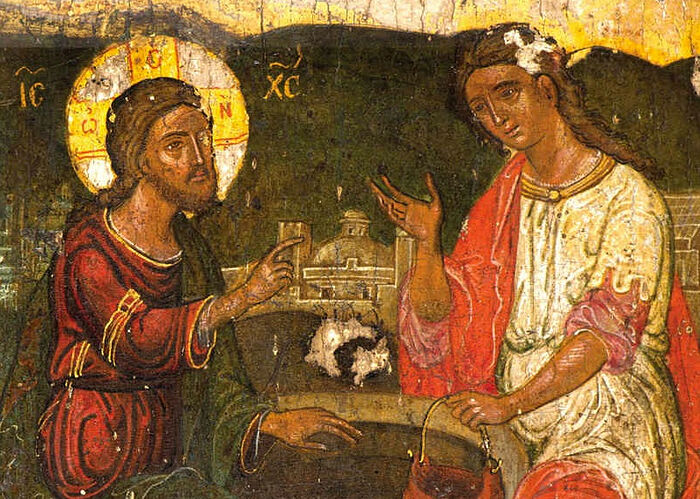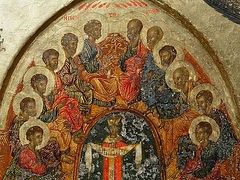As the holy Apostles prepared themselves for fifty days after the Resurrection of Christ to receive the promised Holy Spirit, so the holy Church, through its feasts, wants to unlock the thirst for the gifts of the Holy Spirit, Whom we pray to be sent down upon us on the feast of Pentecost.
The Church first remembers the Apostles and the Myrrh-Bearing Women, who saw Christ after the Resurrection and who heard the promise from His own mouth: Receive ye the Holy Spirit (Jn. 20:22), and then prepared to receive Him by prayers and supplications in the Zion Upper Room (Acts 1:14). Then the holy Church recalls the healing of the Paralytic at the Sheep’s Pool, foretelling how by the Divine Baptism of water and of the Spirit (Jn. 3:5), “now Christ cleanses the innumerable multitude,” whereas “of old the angel descended to the sheep's pool, healing one man every year.”[1]
The feast of Mid-Pentecost recalls how on the Old Testament feast of Mid-Pentecost Christ aroused a spiritual thirst in the Jews; that is, a thirst for faith in their coming Messiah, for communion with Him, and the grace of the Holy Spirit given by Him. If any man thirst, let him come unto Me, and drink (Jn. 7:37), He said about all of this. The Sunday of the Samaritan Woman again recalls how from ordinary water, the Lord raised the Samaritan Woman’s thoughts to the comprehension of the water of life, and from bodily to spiritual thirst, that is, to the thirst for hearing His word, to the thirst for the grace of the Holy Spirit, Who arouses spiritual thirst in people. Finally, on the last Sunday before Pentecost, we remember the healing of the man born blind at the Pool of Siloam, which signified enlightenment by the grace of the Holy Spirit, Who is sent into the world by Christ and is “the spiritual eyes of the blind.”
But do the sons and daughters of the holy Church heed its calls? Is spiritual thirst aroused in their souls, a thirst for the gifts of the Holy Spirit, Who reveals fountains of living water for the soul? Are not the majority of the sons and daughters of the Church like the Samaritan Woman before her encounter with Christ, whose soul was darkened and tormented by the passions of life and earthly cares that led her to Jacob’s Well? As the Samaritan Woman couldn’t immediately understand what living water Christ was talking about, so men, either completely occupied with the affairs and cares of everyday life or immersed in the vanity of the passions and pleasures of earthly life, are usually far from understanding the lofty deeds and words of God. Such preoccupation and immersion in earthly vanity, with inattention to the soul and the action of the Holy Spirit in it, turn into such a permanent habit for a man that, having freed himself from the vanity of earthly affairs and passions, he begins to languish and hurries back to them as soon as possible. So the spiritual thirst in him gradually fades away; he becomes unable to feel it, not experiencing the pleasure of quenching it when hearing the Divine word; and his soul languishes from the heat of passion untempered by the activity of the Holy Spirit that enlivens the soul.
What causes the thirst for the Divine to fade in men, so that they no longer experience it?
Because, first of all, as the Lord says through the Prophet: They have forsaken Me the fountain of living waters, and hewed them out cisterns, broken cisterns, that can hold no water (Jer. 2:13); that is, instead of Divine grace, they try to quench the thirst of the soul with the founts of earthly joy and pleasures, which can only temporarily suppress, but not quench spiritual thirst; and also because they don’t use those means that are necessary to maintain Divine thirst in the soul. Quenching the thirst that torments a wayfarer, water arouses his entire being, renewing his spiritual and bodily powers; in the same way, the whole being of man ought to be refreshed by quenching his thirst for the Divine. So it was with the Samaritan Woman, who, having quenched her spiritual thirst with the words of Christ’s teaching, according to His word, truly never thirsted again (Jn. 4:14), for she abandoned her previous life. Then having been enlightened by holy Baptism, she endured terrible torments, and through her martyric end during the reign of Nero, inherited eternal life.
This is how the holy Church teaches its children to quench their spiritual thirst in its hymns on these present feasts. It inspires us that, “giving the soul the waters of piety,” we have not simply allowed the words of the Church’s hymns to enter our mind, but have also received the Divine law of Christ with its “commands;” and having received the law of Christ, entering into the most sincere communion with Him through “eating the flesh of the Lord” and drinking blood from the Lord’s side, “they extinguished the temptation of the coals”;” that is, they bridled the passions and earthly pleasures that torment the soul like the sweltering heat. That’s why the “strength of the Spirit,” “the grace of the Comforter” is given to people, so that by the love of Christ softening the pain of soul caused by the suppression of the passions in it, moderating the heat of the passions by the dew of grace, and pouring the sweetness of spiritual consolation into it, to help people “learn perfect Divine virtue,” “to sincerely observe the commandments of God,” and acquire immortal life in heaven according to His call.”[2]
Let us strive, following the calls of the holy Church, especially in these holy days of Pentecost, to maintain a thirst for “living water” within ourselves, a thirst for communion with Christ, a thirst for the grace of the Holy Spirit sent by Him into the world! May that which we often sing these days be fulfilled in us: “O divine, O dear, O sweetest Voice! For Thou, O Christ, hast faithfully promised to be with us to the end of the world… O great and holiest Pascha, Christ! O Wisdom, Word and Power of God! Grant that we may more perfectly partake of Thee!”[3] Just as the Samaritan Woman left her pitcher, feeling a thirst for hearing the word of Christ in her soul, so let us be ready to lay aside even the urgent cares of life at least for a time when they stifle the thirst for the Divine in our souls on the holy days of the feasts.
In particular, those of us who are called or will be called to sow the seeds of good teachings among the people should be vigilant in relation to their soul, that the spiritual thirst in it might not fade away, that as the Holy Spirit was first poured out on the Apostles on the day of Pentecost, so those who continue their work today, filled with the gifts of the Holy Spirit, might pour forth rivers of living water to the people (Jn. 7:38). For how can one arouse the thirst in a soul for hearing the word of God if he can’t arouse it in himself? While our people have a strong thirst for the Divine, which was aroused in them by faith in Christ and supported by reading the Word of God, which became accessible to the understanding of the Slavs thanks to the Enlighteners of the Slavs, so that the words of the Lord spoken to the Apostles after the conversation with the Samaritan Woman would also be applied to those working among our people: Lift up your eyes, and look on the fields; for they are white already to harvest… I sent you to reap that whereon ye bestowed no labour: other men laboured, and ye are entered into their labours (Jn. 4:35, 38). May responsibility before God not fall on these figures for the fact that, entering into the work already begun by the holy Church, and which is therefore easier for them, they extinguish and not support this Divine thirst among the people, extinguishing it in themselves with constant vanity and worldly passions! Amen.




